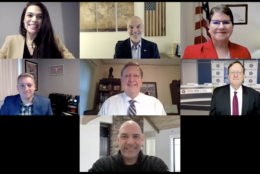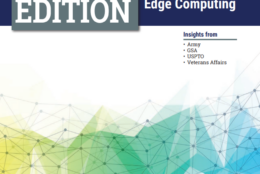SDFM The Business of Defense
-
Federal News Network surveyed five agencies to detail the current and future impact of SaaS across their mission areas. Download the survey to learn more.
March 03, 2022 -
Can artificial intelligence help agencies stay ahead of cyberthreats, especially as attackers get cleverer and potential attack vectors increase? BlackBerry CTO Charles Egan shares insights on why and how AI tools can help.
March 03, 2022 -
When you think of rain forests, wildfires don’t typically come to mind. But the Director of the Oregon Office of Emergency Management said that’s changing –rapidly.
March 02, 2022 -
The need to define budgets for programs two or more years before spending a single dime creates a challenge ensuring allocations align with spending at most Defense organizations. Is there a better way? We talk with the chief scientist at Decision Lens to find out.
March 01, 2022 -
Permanent hybrid environments will require agencies to give teleworkers capabilities identical to what they have in the office. Here are the three critical requirements to make that possible.
March 01, 2022 -
With the advent of 5G nationwide, local governments have the opportunity to reimagine — perhaps jump-start — smart city initiatives. Learn a few tips and tactics to launch citizen-centric projects, even in these fiscally constrained times.
March 01, 2022 -
During this webinar, you will learn how federal IT practitioners from the U.S. Patent & Trademark Office, Internal Revenue Service and Department of Homeland Security are implementing strategies and initiatives around IT modernization.
February 28, 2022 -
Productivity, ease of collaboration and customer experience expectations make supporting high-quality virtual collaboration tools critical. Zoom industry experts share their perspective on what’s to come.
February 28, 2022 -
What is the data strategy for the Defense Information Systems Agency (DISA)? How is DISA leveraging data as a strategic asset? Join host Michael Keegan as he explores these questions and more with Caroline Kuharske, Acting Chief Data Officer, DISA.
February 28, 2022 -
Dr. Mary Bassett, New York State Commissioner of Health, says the COVID Omicron variant is still exposing health inequities — African Americans in New York have been hospitalized twice as much as the majority population during this latest wave. Bassett says achieving health equity “will be the North Star of my working life as a physician committed to public health.” Bassett also tells Conversations on Health Care hosts Mark Masselli and Margaret Flinter that the state has four times as many hospitalized now compared to the pandemic lull last summer. Yet she also notes the hospitalization and case rates are going down.
February 28, 2022 -
Government IT organizations have begun the heavy lifting necessary to modernize infrastructure and move toward an edge computing model. Pick up pointers from efforts at the Army, GSA, USPTO and Veterans Affairs in this exclusive ebook.
February 25, 2022 -
Every storm is different. Brian Hastings, director of the Alabama Emergency Management Agency, suggested that responding to a disaster requires a certain amount of precision and that only comes from practice, familiarity with the team and solid communications.
February 25, 2022 -
With a compelling storyline of acquisition support in a ground mission to Mars, Management Concepts launches an experiential, cohort-based program designed for new acquisition professionals. On the next episode of FEDtalk, Management Concepts reveals Career Gateway: Acquisition.
February 25, 2022 -
With the evolution of how people work in government now, has your agency successfully scaled its meeting and collaboration capabilities? We share four factors to consider when planning a fully scalable meeting solution.
February 24, 2022 -
This week, hosts Mark Masselli and Margaret Flinter welcome Dr. Anthony Fauci back to the show, two years after his first appearance discussing the novel coronavirus spreading around the world. The Chief Medical Advisor to the Biden White House and long-time Director of the National Institute for Allergy and Infectious Diseases at the NIH expressed concern over the ongoing political divisiveness impacting our ability to contain COVID outbreaks leading to almost 1 million deaths in this country. He says FDA approval of the mRNA vaccine for young children will likely come on the heels of better data on efficacy with a third dose. He still marvels at the dramatic scientific achievement of the swift development and deployment of an effective vaccine against a challenging new pathogen, which he said would not have happened without decades of committing our resources to scientific research.
February 21, 2022















